The Dachau Concentration Camp Memorial Site Tour from Munich takes visitors on a somber journey into one of history’s darkest chapters. Exploring the reconstructed prisoner barracks and original gas chambers, the tour provides a poignant glimpse into the harrowing conditions endured by those imprisoned under Nazi rule. While the subject matter is undoubtedly heavy, the tour’s importance lies in its ability to honor the memory of those who suffered and lost their lives, reminding us all of the profound lessons we must carry forward.
Just The Basics
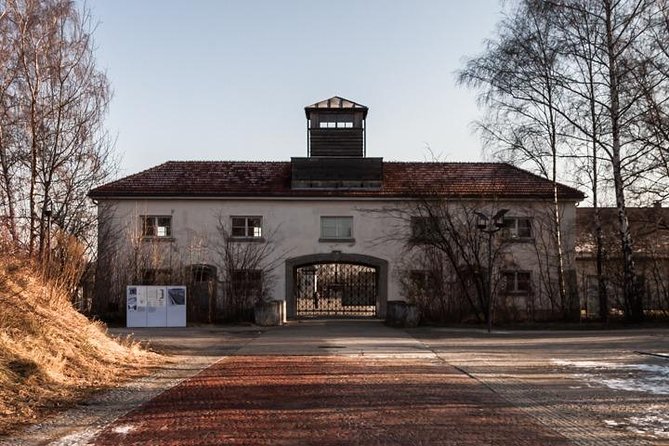
- Comprehensive tour of the Dachau Concentration Camp Memorial Site, the first permanent Nazi concentration camp established in 1933.
- Guided exploration of reconstructed prisoner barracks, gas chambers, and crematorium to understand the brutality and inhumanity of the Nazi regime.
- Opportunity to reflect on the tragic history and honor the memory of the victims through a somber and profound experience.
- Shared round-trip transfers from central Munich and a professional guide to provide historical context and insights.
- Tour requires moderate physical fitness, as it involves a fair amount of walking on uneven terrain, and is not wheelchair accessible.
Overview of Dachau Concentration Camp
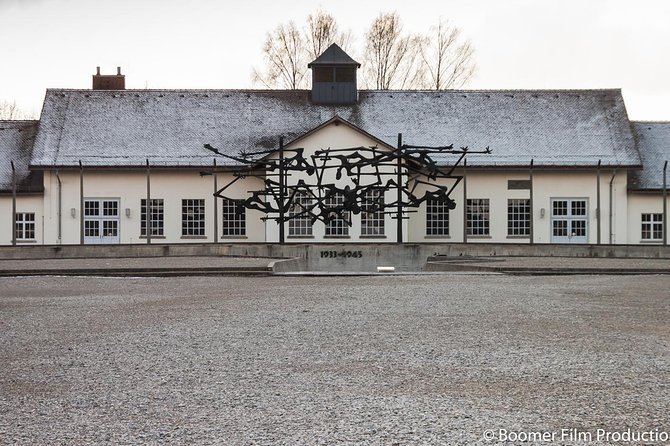
Dachau was the first permanent concentration camp established by the Nazi Party, constructed in 1933 near the town of Dachau, approximately 10 miles northwest of Munich.
Over its 12 years of operation, Dachau held around 200,000 prisoners, including political dissidents, religious leaders, and Jews.
Visitors to the Dachau Concentration Camp Memorial Site can explore the reconstructed prisoner barracks, gas chambers, and crematorium, gaining a somber understanding of the harsh realities faced by prisoners under Nazi rule.
The memorial serves as a powerful reminder of the atrocities of the Holocaust and the importance of preserving history to prevent such horrors from happening again.
You can also read our reviews of more tours and experiences in Munich.
Prisoner Life Under Nazi Rule
Prisoners at Dachau Concentration Camp endured brutal living conditions and cruel treatment under the Nazi regime, with many facing starvation, disease, and death on a daily basis. Inmates were forced to work long hours in the camp’s factories and quarries, often without adequate food, water, or medical care. The conditions were squalid, with overcrowded and unsanitary barracks, and the threat of violence and punishment ever-present. Below is a table outlining some key aspects of prisoner life at Dachau:
| Condition | Description |
|---|---|
| Forced Labor | Grueling work in factories, quarries, and farms |
| Nutrition | Meager food rations, leading to malnutrition and starvation |
| Healthcare | Lack of medical treatment, leading to spread of disease |
| Punishment | Beatings, torture, execution for minor infractions |
Visitors Center and Reconstructed Barracks
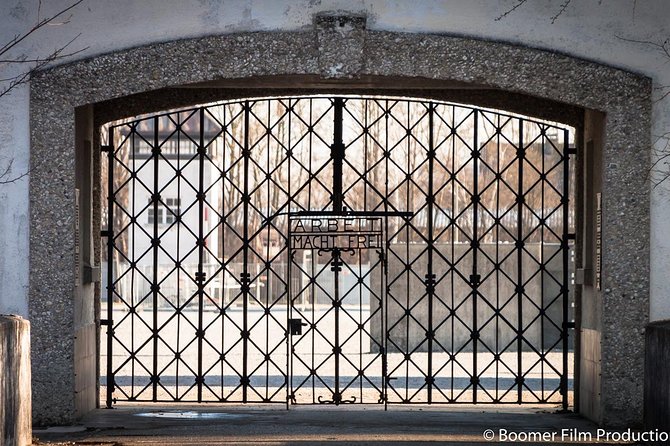
The Dachau Concentration Camp Memorial Site features a visitors center that provides a powerful introduction to the dark history of the camp.
Visitors can explore reconstructed barracks, offering a sobering glimpse into the cramped and dehumanizing conditions endured by prisoners.
The visitors center houses exhibits that detail the camp’s hotel, the brutality of the Nazi regime, and the fates of those imprisoned.
Visitors can walk through replicas of the original barracks, gaining a visceral understanding of the horrors experienced by the thousands of men, women, and children held captive at Dachau.
The memorial site stands as a solemn reminder of the past and a testament to the resilience of the human spirit in the face of unimaginable cruelty.
Touring the Gas Chambers
Visitors to the Dachau Concentration Camp Memorial Site are able to tour the original gas chambers, where thousands of innocent people were cruelly murdered by the Nazi regime.
Through this profoundly somber experience, guests can begin to fathom the unfathomable horrors that transpired within these chilling confines. The gas chambers, now preserved as a solemn reminder, stand as silent witnesses to the atrocities committed by the Nazi party.
Guests are given the opportunity to reflect on this dark chapter of history and honor the memory of those whose lives were unjustly taken. This harrowing tour underscores the importance of remembering the past, so that such tragedies may never be repeated.
Logistics and Tour Details
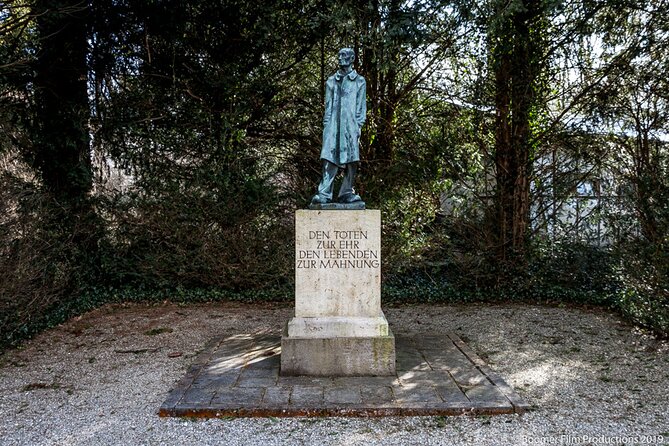
The Dachau Concentration Camp Memorial Site tour from Munich includes round-trip shared transfers from central Munich, with a professional guide leading the tour.
The tour doesn’t include food, drinks, or gratuities, so participants should come prepared.
Travelers should arrive 10 minutes early to the meeting point at Marienplatz 11 in central Munich.
The tour operates in all weather conditions, so participants should dress appropriately.
Children aged 14-17 must be accompanied by an adult, and the tour isn’t wheelchair accessible, requiring a moderate level of physical fitness.
With these details in mind, visitors can expect a comprehensive and insightful exploration of the Dachau Concentration Camp Memorial Site.
- Guided Dachau Concentration Camp Memorial Site Tour With Train From Munich
- Dachau Concentration Camp Memorial Tour With Train From Munich
- Dachau Tour From Munich
- Full-Day Dachau Concentration Camp Memorial Site Tour From Munich
- Dachau Small-Group Half-Day Tour From Munich by Train
- Munich World War II Sites Including Dachau Concentration Camp
Accessibility and Physical Fitness Requirements
The Dachau Concentration Camp Memorial Site tour isn’t wheelchair accessible, requiring a moderate level of physical fitness from participants.
Children aged 14-17 must be accompanied by an adult due to the sensitive nature of the content.
Visitors should expect to do a fair amount of walking on uneven terrain throughout the memorial site.
Those with limited mobility or stamina may find the tour challenging.
The tour operates rain or shine, so appropriate clothing and footwear are advised.
While the memorial site is an important historical site, the subject matter can be emotionally difficult.
Travelers should consider their own physical and emotional abilities before booking the tour.
Cancellation Policy and Refund Information
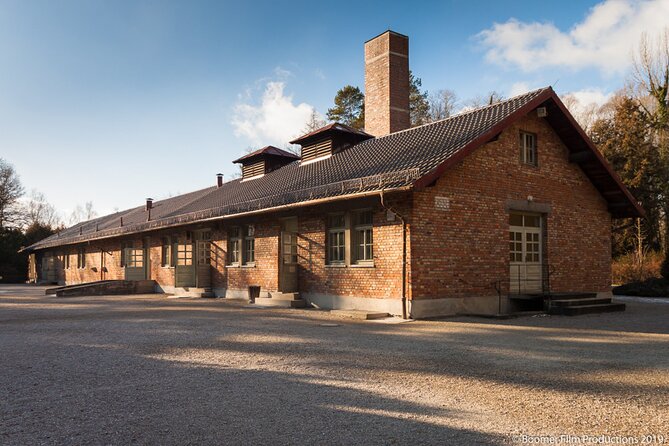
Typically, a full refund is provided if the Dachau Concentration Camp Memorial Site tour is canceled at least 24 hours in advance. However, no refund is offered for cancellations made less than 24 hours before the scheduled start time. This policy is in place to ensure the tour operator can plan accordingly and provide the best possible experience for all participants.
The cancellation and refund policy for this tour is as follows:
- Full refund if canceled 24 hours or more before the start time.
- No refund for cancellations less than 24 hours before the tour begins.
- Refunds are processed within 7-10 business days.
- Travelers are responsible for any fees incurred by their payment method.
Outstanding Guest Reviews
Consistently, tour participants have left glowing reviews for the Dachau Concentration Camp Memorial Site tour from Munich, praising its educational value and powerful impact. The tour has earned a coveted 5-star rating from over 525 reviewers, with many remarking on the guide’s expertise and the tour’s ability to convey the sobering history of the site in a thoughtful and impactful way.
| Review Highlights |
|---|
| "Incredibly moving and poignant" |
| "A must-do to understand the past" |
| "Respectful and informative guide" |
| "Humbling and eye-opening experience" |
| "Left with a deeper appreciation" |
This overwhelmingly positive feedback underscores the tour’s ability to provide a meaningful and impactful look into one of history’s darkest chapters.
Frequently Asked Questions
Are There Any Breaks or Stops During the Tour?
The tour doesn’t include any scheduled breaks or stops. However, visitors are free to take short breaks as needed during the tour. The guide will accommodate any reasonable requests for rest or personal needs.
Can I Bring My Own Water/Snacks on the Tour?
Yes, visitors are welcome to bring their own water and snacks on the tour. However, food, drinks, and gratuities are not included in the tour cost. Travelers should plan accordingly for their personal needs during the tour.
Is There an Option for a Private Tour?
Yes, the tour offers a private option. Travelers can book a private Dachau Concentration Camp Memorial Site tour from Munich, which provides a more personalized experience with a dedicated guide focusing on the visitor’s specific interests.
What Language(S) Is the Tour Conducted In?
The tour is conducted in English. The guide provides a professional, compassionate explanation of the site’s history and significance in multiple languages, ensuring all visitors can fully understand and appreciate the tour.
Are There Any Audio/Multimedia Elements During the Tour?
The tour doesn’t include any audio or multimedia elements. Instead, the professional guide provides an informative and thoughtful walking tour, sharing historical details and insights about the Dachau Concentration Camp Memorial Site through their knowledgeable commentary.
Final Words
Visiting the Dachau Concentration Camp Memorial Site is a profoundly moving experience that reminds us of the horrors of the past.
The tour provides a somber yet essential glimpse into the suffering endured by prisoners, honoring their memory and underscoring the importance of never forgetting.
This emotionally impactful journey serves as a powerful lesson in preserving the values of human dignity and justice for all.
More Tours in Munich
- Munich: Mini Classic Bike Tour with Beer Garden Stop at 4 PM
- National Socialism WWII with licensed guide – private tour
- Munich: Dachau Concentration Camp Private Tour by Car
- Munich: Residenz Museum Tickets and 2,5-hour Guided Tour
- Munich and Nazi History Combination Day Tour Small Group
- Private Munich Bike Tour with Beer Garden Lunch Break
More Tour Reviews in Munich
- Munich: Raven Black Witches and Executioners Walking Tour
- Munich: Night PubCrawl Shots and Party!
- Munich: Phototour – Your guide to beautiful photo spots
- Munich: Private or Group Third Reich and WWII Walking Tour
- Munich: Classic Guided City Tour by Bike (English Tour Only)
- Oktoberfest Tour: All in!!! Table reservation with 2 tickets for rides
Not for you? Here's more things to do in Munich we have recnetly reviewed
- Munich: Old Town Highlights Private City Tour – Walking Tour
- Munich Residenz: Master Concert in the Hercules Hall
- Munich: Private Walking Tour Munich Highlights
- Munich: River Surfing in MunichSurfing all you need to know
- Munich: Adventurous Bachelor Party Surf Experience – Munich
- Munich: Private Tour with a Local Guide
- Munich: Highlights Walking Tour with a Guide
- Munich Specials (choose!): OldTown, Dachau, 10Tastes, Spooky
- Munich: Wheelchair Rickshaw Tour through the English Garden
- Third Reich: Art, Cult and Ideology behind the tragedy
- Munich: Private Highlights Tour by Car – Private Tour Guide
- Secret Food Tours Munich
